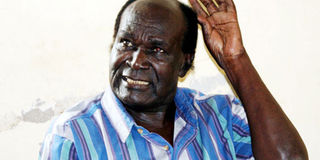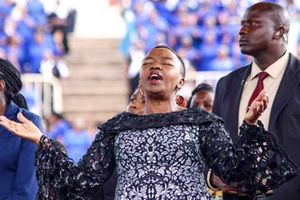Choir man Kenyatta loved to death

Mzee Enock Ondego. Photo/FILE
What you need to know:
- The choir was the brainchild of primary school teacher Enock Ondego, a man whose life story is intertwined with the presidency of Mzee Jomo Kenyatta.
- The 83-year-old displays scars on his chest and his feet that he sustained during battles with members of the Mwambao United Front, who were violently agitating for the Coastal Strip to join Zanzibar just before independence.
There was a surreal mood at the 2013 Mashujaa Day celebrations when the choir that entertained President Jomo Kenyatta at the last public function before his death 36 years ago held the entire nation spellbound with two songs that stirred memories of the liberation struggle against colonialism in Kenya.
The name of the Mwakigwena Choir from Kwale County may not be instantly recognisable to many people, but their two songs Wimbo wa Historia and Kenya Yetu, though written more than 40 years ago, still resonate powerfully with generations of Kenyans.
The choir was the brainchild of primary school teacher Enock Ondego, a man whose life story is intertwined with the presidency of Mzee Jomo Kenyatta.
Born in Mazigolo, South Maragoli, Ondego attended school until Standard Seven, then joined Kaimosi Teachers’ Training College, where he qualified as a P3 teacher at age 17.
He became steeped in the pre- independence politics in the 1950s after opening the first Mombasa office of the Kenya African National Union (Kanu) as the branch assistant secretary. The first songs he wrote were liberation songs to lift the spirits of the freedom fighters.
The 83-year-old displays scars on his chest and his feet that he sustained during battles with members of the Mwambao United Front, who were violently agitating for the Coastal Strip to join Zanzibar just before independence.
After 1963, he was posted to Samburu Primary School in Mombasa and the following year, he led his choir in a performance at State House, Mombasa. “The President would come to the Coast every April, August and December and my choir would always be on the highway to welcome him with songs.”
REGULARS AT PRESIDENTIAL FUNCTIONS
By 1966, Ondego and his choir were regulars at presidential functions and the following year, they were invited for the first time to sing at Kenyatta’s home in Gatundu.
A year later, he was transferred to Mwakigwena Primary School in Kwale, where he formed a mixed choir and composed the two famous songs, recorded in 1969 by Assanands & Son Company in Mombasa. “We squeezed into a studio no bigger than a telephone booth and recorded both songs, for which we were paid Sh60,” he recalls.
He faced strong opposition from parents and the community, who said he was leading their children astray by recruiting them into the choir.
“The only place we could rehearse was in my house, and anytime we got on a bus going for a performance, there would be people throwing strange items at us and calling us genies.”
Exasperated, Ondego left Mwakigwena in 1971 and returned to Vihiga, where he formed a choir comprising school leavers. That year, his choir won at the Kenya Music Festival and was selected to entertain President Kenyatta in Gatundu.
“Mzee immediately recognised me and when he asked why I was not singing at the Coast anymore, I explained that I had returned home to take care of my sick mother. The President was livid: “Shut Up! Kwani, wewe ni mungu (do you think you are God?).”
'I WAS TIRED BUT HE KEPT MOTIONING US TO CONTINUE'
Kenyatta ordered the Provincial Commissioner to give Ondego Sh5,000 for him to travel back to the Coast. But Ondego spent the money on liquor and remained in Western Kenya.
The same thing happened the following year.
In 1973, after the choir won at the nationals and performed in Gatundu, the president ordered its members transported back to Western Kenya, but that Ondego report to Mombasa.
One morning, the assistant chief went to his home, handcuffed him, bundled him into an official Land Rover and drove him straight to the PC’s office in Kakamega, and then on to Mombasa.
Ondego was posted to Kwale Primary School and with his choir, entertained the President on all his visits to the Coast Province for the next five years.
In August 1978, the choir performed for Kenyatta on consecutive days at Gombani, Tiwi, and eventually at Bomani in Msambweni on the 21st.
“On that day with his entire family present, we performed song after song and Mzee would prompt us to continue. I tried to indicate that I was tired but he kept motioning us to continue.”
Ondego says they were doing their 9th song when the president collapsed and was quickly whisked away. “That was the last time I saw Mzee alive. The next day we heard that he was dead.”
It is not clear who came up with the claim that all the Mwakigwena choir members had died in a road crash, but the story spread and was repeated as their songs were played on national holidays.
Of the six boys and five girls who were between seven and 11 years old in 1969, three have died and have been replaced by singers who were in the same school but not in the original choir.
Ondego retired from teaching in 1990 after his last posting at Ramisi Primary School.




